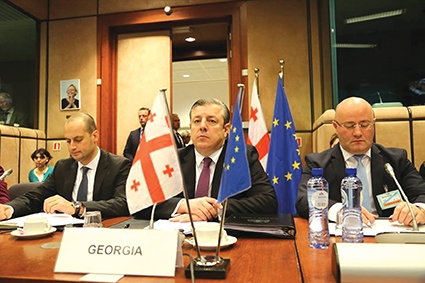EU-Georgia Association Council Discusses DCFTA Benefits
The 3rd Association Council meeting between the European Union and Georgia, held on Friday in Brussels, discussed all directions of European Union (EU)-Georgia cooperation and welcomed the initial benefits of economic integration through the Deep and Comprehensive Free Trade Agreement (DCFTA) implementation.
The ensuring of long-term sustainable development and inclusive economic growth were highlighted as core goals of the Georgian Government's domestic reform program, in line with the commitments of the Association Agreement.
The EU underlined the importance of sound macroeconomic policies in this respect and welcomed the renewed momentum for Georgia to reach an agreement with the International Monetary Fund (IMF).
Moreover, the Council welcomed the positive trends in trade between the EU and Georgia since the provisional application of the DCFTA. The sides highlighted the importance of creating more “success stories” in terms of new market openings for Georgian products, as well as the need to better communicate the advantages of the DCFTA to attract Foreign Direct Investments (FDIs).
Both sides welcomed the decision of the Joint Committee of the Pan-Euro-Mediterranean Convention on Rules of Origin to admit Georgia as a contracting party to the Convention that will further facilitate the export of Georgian products to the EU market.
The Association Council underlined Georgia's strategic role in the field of energy and transport connectivity and welcomed the signature of the Protocol on the accession of Georgia to the Energy Community on 14 October, as envisaged by the implementation of the Association Agreement.
The Council welcomed the solid EU assistance provided to Georgia, which had particularly increased in the period 2014-2017 with an annual average of EUR 100 million available to support the ambitious political, judicial and economic reforms envisaged in the Association Agreement and Association Agenda.
The Association Council underlined the importance of the promotion of EU investments in the Georgian economy and welcomed a proposal to focus future assistance for 2017-2020 on Economic Growth, Private Sector Support and developing efficient value chains and increased competitiveness in selected sectors with high export potential and import substitution.
The meeting’s participants stressed the importance of the successful cooperation established between the EU and Georgia on Strategic Communication.
The EU side expressed its readiness to assist Georgia's increased participation in EU programs in order to bring tangible results to the population. The Association Council commended Georgia's growing cooperation with the EU agencies and welcomed further steps in this direction, encouraging the strengthening of sectoral cooperation through enhanced dialogue between the relevant EU and Georgian institutions and use of all available EU instruments.
Furthermore, the Council reiterated its firm support for the territorial integrity of Georgia within its internationally recognized borders, as well as its firm commitment to peace, stability and conflict resolution in Georgia. It also condemned the ratification of a military deal between Georgia’s breakaway region Abkhazia and Russia.
Georgia's successful implementation of all required benchmarks under the Visa Liberalization Action Plan (VLAP) was also underlined. The Association Council stressed the importance of a prompt finalization of the decision-making process required to exempt Georgian citizens holding biometric passports from visa requirements within the Schengen area.
The EU also expressed appreciation for Georgia's continued contribution to EU-led crisis management operations and missions in the Central African Republic and the Republic of Mali, as well as its readiness to support the strengthening of respective capacities of the country.
The Council is the highest formal body established under the EU-Georgia Association Agreement to supervise the implementation of the Agreement and to discuss issues of mutual interest. The meeting took place after the entry into force of the Association Agreement on July 1 that marked the start of its full-scale implementation.
The Council was chaired by the High Representative of the European Union for Foreign Affairs and Security Policy, Federica Mogherini. The Prime Minister of Georgia, Giorgi Kvirikashvili, led the Georgian delegation consisting of members of the Government of Georgia.
Thea Morrison











